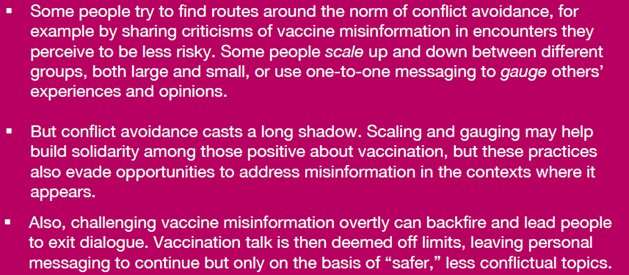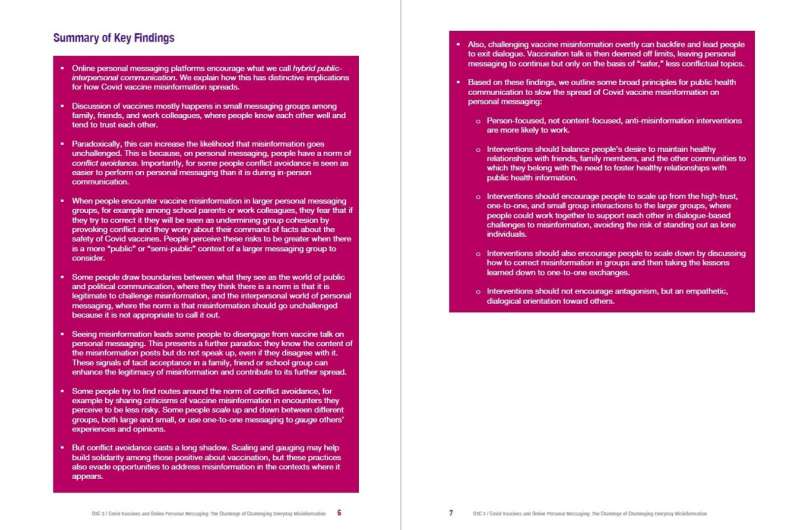Why people don’t call out COVID-19 vaccine falsehoods on WhatsApp

When people see COVID-19 vaccine misinformation on online personal messaging platforms and don’t speak up, this can boost the legitimacy of false claims and further their spread. So why don’t we correct our peers?
In a first-of-a-kind public report, experts from Loughborough University’s Online Civic Culture Centre have uncovered the social norms that shape whether people challenge misinformation about COVID-19 vaccines in the largely hidden worlds of personal messaging platforms such as WhatsApp and Facebook Messenger.
Professor Andrew Chadwick, Professor Cristian Vaccari and Dr. Natalie-Anne Hall found personal messaging encourages what they call “hybrid public-interpersonal communication,” which has distinctive implications for how vaccine misinformation spreads.
“Discussion of vaccines mostly happens in small messaging groups among family, friends, and work colleagues—where people know each other well and tend to trust each other,” say the researchers.
“Paradoxically, this can increase the likelihood that misinformation goes unchallenged. This is because, on personal messaging, people have a norm of conflict avoidance.
“Importantly, for some people conflict avoidance is seen as easier to perform on personal messaging than it is during in-person communication.”
The report, based on nine months of intensive fieldwork funded by the Leverhulme Trust from a £347,000 grant, says seeing misinformation leads some people to “disengage from vaccine talk on personal messaging.”
“This presents a further paradox,” say the researchers, “they know the content of the misinformation posts but do not speak up, even if they disagree with it.
“These signals of tacit acceptance in a family, friend or school group can enhance the legitimacy of misinformation and contribute to its further spread.”
The report also looks at what people do when they encounter vaccine misinformation in larger personal messaging groups, such as among school parents or work colleagues.
The researchers found people fear that if they try to correct misinformation, they will be seen as undermining group cohesion by provoking conflict and they worry about their knowledge of the safety of COVID-19 vaccines. These risks are perceived to be greater the more “public” the group is, even though school and work messaging groups are never fully public in the same way as social media.
Other key findings include:

The report goes on to outline broad principles for public health communicators to slow the spread of vaccine misinformation on personal messaging platforms.

Of the importance of the report, the authors said: “Gaps in levels of protection from COVID-19—unvaccinated, first dose, second dose, third primary dose, booster, top-up booster—are multiplying and widening.
“Personal messaging is hugely popular and has grown rapidly in recent years. In the UK, WhatsApp alone has 31.4 million adult users—about 60% of the entire UK adult population—and is more widely and frequently used than any of the public social media platforms.
“In some of our previous research, we found evidence that people use personal messaging to discourage people from getting vaccinated.
“However, we also found that vaccine encouragement via personal messaging is more common, which suggests that online personal messaging could be one focus of a broader online communication program to reduce the spread of COVID-19 vaccine misinformation and promote the benefits of vaccination for individuals and society.
“At present, however, researchers and health communicators have very poor understanding of the forms that vaccine encouragement and discouragement take in the hidden world of personal messaging platforms, and how people deal with vaccine misinformation in these spaces.
“This report addresses this gap in knowledge.”
COVID Vaccines and Online Personal Messaging: The Challenge of Challenging Everyday Misinformation. www.lboro.ac.uk/media/media/re … l-Messaging-2022.pdf
Citation:
Why people don’t call out COVID-19 vaccine falsehoods on WhatsApp (2022, April 11)
retrieved 12 April 2022
from https://phys.org/news/2022-04-people-dont-covid-vaccine-falsehoods.html
This document is subject to copyright. Apart from any fair dealing for the purpose of private study or research, no
part may be reproduced without the written permission. The content is provided for information purposes only.
For all the latest Science News Click Here
For the latest news and updates, follow us on Google News.

